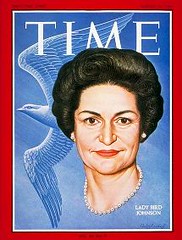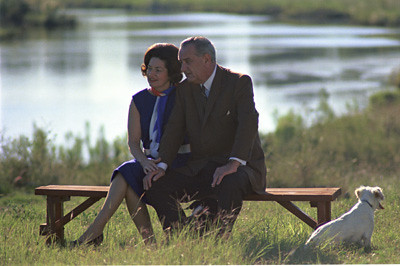 Lady Bird died today, Wednesday, July 11, 2007. She was 94. She is credited with introducing concern for the environment to the public stage in Washington by working for passage of the 1965 Highway Beautification Bill, which became known as "The Lady Bird Bill." She lived the life of a conservationist long after her husband, President Lyndon B. Johnson, left her a widow in 1973.
Lady Bird died today, Wednesday, July 11, 2007. She was 94. She is credited with introducing concern for the environment to the public stage in Washington by working for passage of the 1965 Highway Beautification Bill, which became known as "The Lady Bird Bill." She lived the life of a conservationist long after her husband, President Lyndon B. Johnson, left her a widow in 1973. Lady Bird worked to get her husband elected as vice president (she once gave 47 speeches in four days on the campaign trail). After he became president she worked for his agenda. Lady Bird served as honorary chairwoman of the national Head Start Program, a program created as part of her husband's Great Society legislative agenda.
 Lady Bird spent much of her life in public service even after husband's death. She served as a University of Texas regent from 1971-1977. A Republican, President Gerald Ford, awarded Lady Bird the country's highest civilian award, the Medal of Freedom, in 1977. Lady Bird served both the Ford and Carter administrations in some capacity. In 1982 she founded the National Wildflower Center (now the Lady Bird Johnson Wildflower Center); she was 70 then.
Lady Bird spent much of her life in public service even after husband's death. She served as a University of Texas regent from 1971-1977. A Republican, President Gerald Ford, awarded Lady Bird the country's highest civilian award, the Medal of Freedom, in 1977. Lady Bird served both the Ford and Carter administrations in some capacity. In 1982 she founded the National Wildflower Center (now the Lady Bird Johnson Wildflower Center); she was 70 then. Up until almost her death Lady Bird had been making occasional public appearance to lend the authority of her personality to causes she believed in; this, despite the fact that a stroke left her almost unable to speak for the last five years. She didn't have to speak; the force of her personality was enough.
This article was originally published in January of 1999 at Suite 101.
Roses: if you've got to get rid of them, this is the time of year to do it. In mid-winter the plants are easy to break and there are no leaves to hide the thorns. But why get rid of roses? Before I answer that, a little background...
Last year the National Wildflower Research Center honored Claudia Alta "Lady Bird" Johnson by renaming their center after her.
 Personally, I'm no big fan of Widow Johnson. But before I explain why, let me give you a little update on Lady Bird.
Personally, I'm no big fan of Widow Johnson. But before I explain why, let me give you a little update on Lady Bird.I was surprised in the process of preparing this article to discover that Lady Bird Johnson is still alive. The former first lady celebrated her 86th birthday in December. The National Wildflower Research Center was founded by Lady Bird about 16 years ago.
At 86, Lady Bird is legally blind, walks with the help of a cane, and suffers from arthritis. She lives on the family's Hill Country ranch, where her late husband is buried. She has three grandchildren.
Lady Bird Johnson's involvement in environmental issues gained national attention in the mid 1960's. Her work on the issue was the driving force behind the 1965 Highway Beautification Act (the HBA). That act regulated the advertising that could be displayed alone federal highways and promoted the spread of wild flowers as a way of making rural America a prettier place to visit.
In November of 1996, Lady Bird was given the Environmental Law Institute's ELI Award. ELI Board Chairman Don Stever called Johnson "the First Lady of environmental management". Johnson's granddaughter, Lucinda Robb, accepted the award for her.
"Lady Bird Johnson's name is synonymous with the beautification of America," Stever said.
Well, I suppose that depends in part on your idea of beauty...

I have two main bones to pick with the former first lady over the issue of what is and what is not beautiful. The first has to do with the advertising focus of the HBA.
One of the places that suffered the most from The Lady Bird Act, as the HBA became known, was an Appalachian landmark: Rock City. The Lady Bird Act took the 10-acre garden spot on top of Lookout Mountain, Tennessee, and targeted its main form of advertising: barn roofs.
The first lady from Texas didn't like having the See Rock City slogan painted all over the American South - even if it had become a portion of America's heritage. The words covered the sides of little country stores and gas stations in a dozen states. It was a place where advertising met art. And the two usually met on private property.
The barn-painting reached its height in 1956 with over 850 barns bearing the words painted in black and white. But the 1965 Highway Beautification Act singled out barn roof messages along federal funded highways for elimination. Less than 100 of the classics still exist. In Tennessee, some have been made some of them historic landmarks.
Did Lady Bird's efforts to eliminate the offensive barn roofs, etc., fix the "problem" of unwanted advertising alone major highways? The answer is a definite "no".
The Fall 1996 edition of Scenic North Carolina News explains:
The intent of the 1965 Highway Beautification Act (HBA) was to protect the visual environment of rural and scenic areas along federally funded highways. But it hasn't quite worked out that way.
The HBA generally prohibits new billboards, but it makes an exception for areas that are considered to be "industrial" and "commercial." This exception has swallowed the rule and hundreds of thousands of new billboards have been erected since the HBA was passed.
Scenic North Carolina referred to what they called "phony zoning": the city fathers zone a cornfield on the edge of town as commercial/industrial and a few days later it's covered with billboards. On average, the town fathers in question visit the spot twice a year to face Washington and thumb their noses at Lady Bird and the various heads of the U.S. Department of Transportation who have held the position since LBJ left the Whitehouse.
Personally, I'd pay to watch bi-annual ritual.
The N.C. Court of Appeals has upheld the town governments on the issue. The state's Supreme Court has refused to hear the case.
Lady Bird got rid of barns, but not bill boards.
Lady Bird targeted and destroyed what has come to be recognized as folk art. The Lady Bird Act attacked private business on private property for the sake of asthetic concerns that had little to do with real environmental quality: few animals become endangered species because of bill boards or what a farmer paints on his barn. The act was unnecessary government control.
But more than that, the fact that a first lady from Texas did so much to end the advertising of an Appalachian institution, I confess, considerably irritates me.
The second bone I have to pick with Lady Bird has to do with flowers.
I don't mind most wild flowers. I even like some. But I hate wild roses.
Let me rephrase that: I hate roses. I hate roses. I hate roses. I hate roses!
The spread of wild roses was promoted by the Lady Bird Act.
Now I can hear a lot of people out there asking "so what's the big deal?" It's this: roses are the most obstinate and obnoxious forms of unwanted vegetation growing on my land.
Maybe I sound extreme. I know that most people think highly of roses. But their opinion is based on a limited experience with roses: they don't have wild rose bushes growing willy-nilly about their property.
I understand the joy that a woman must feel when she receives a dozen fresh long-stemmed red roses at work for no particular reason. But Southwest Virginia farmland is covered with rose bushes that take over acre after acre of land and are almost impossible to kill. Last year, to have a garden on our new property meant I had to pull up 30 or so square yards of roses by their roots. This year, to add a corn patch to the garden means pulling up another 30 square feet of roses.
Roses also create problems for livestock. One small farmer I know lost three of his 40 or so sheep last year to roses: the sheep get hung up in the thorns of the roses and either shred themselves or thirst to death before they're found...
I was told last year by a county Extension Office agent that wild roses take over 1,700 new acres of Virginia each year. The Extension Office advises and aids county farmers here.
I generally like flowers. But Lady Bird's arrogance in trying to regulate advertising on private property to suit a Texan's taste doesn't endear her to me. And as for wild roses? Well, I personally hope that when the opportunity presents itself, they grow on her grave...


1 comment:
Dear Greg,
Thank you for your article and I completely agree: I HATE wild roses!!! I live in New Jersey and they are completely taking over what used to be the native vegetation. They scramble up trees and choke them, they take over pasture land, gardens, and areas of woodland forest. They truly fit the description of SCOURGE! If I could eliminate them off the face of the planet -- I would dance a lifelong dance of joy and celebration!
Post a Comment